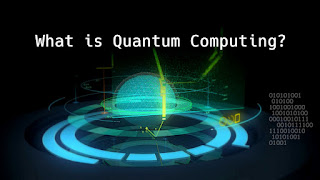NOT LIMITED TO ONLY "0" & "1" !
Quantum computing is computing using quantum-mechanical phenomena, such as superposition and entanglement. A quantum computer is a device that performs quantum computing. Such a computer is different from binary digital electronic computers based on transistors. Whereas common digital computing requires that the data be encoded into binary digits (bits), each of which is always in one of two definite states (0 or 1), quantum computation uses quantum bits or qubits, which can be in superpositions of states. A quantum Turing machine is a theoretical model of such a computer and is also known as the universal quantum computer. The field of quantum computing was initiated by the work of Paul Benioff and Yuri Manin in 1980,Richard Feynman in 1982, and David Deutsch in 1985.
As of 2018, the development of actual quantum computers is still in its infancy, but experiments have been carried out in which quantum computational operations were executed on a very small number of quantum bits.Both practical and theoretical research continues, and many national governments and military agencies are funding quantum computing research in additional effort to develop quantum computers for civilian, business, trade, environmental and national security purposes, such as cryptanalysis A small 20-qubit quantum computer exists and is available for experiments via the IBM Quantum Experience project. D-Wave Systems has been developing their own version of a quantum computer that uses annealing.
Large-scale quantum computers would theoretically be able to solve certain problems much more quickly than any classical computers that use even the best currently known algorithms, like integer factorization using Shor's algorithm (which is a quantum algorithm) and the simulation of quantum many-body systems. There exist quantum algorithms, such as Simon's algorithm, that run faster than any possible probabilistic classical algorithm. A classical computer could in principle (with exponential resources) simulate a quantum algorithm, as quantum computation does not violate the Church–Turing thesis. On the other hand, quantum computers may be able to efficiently solve problems which are not practically feasible on classical computers.




Comments
Post a Comment